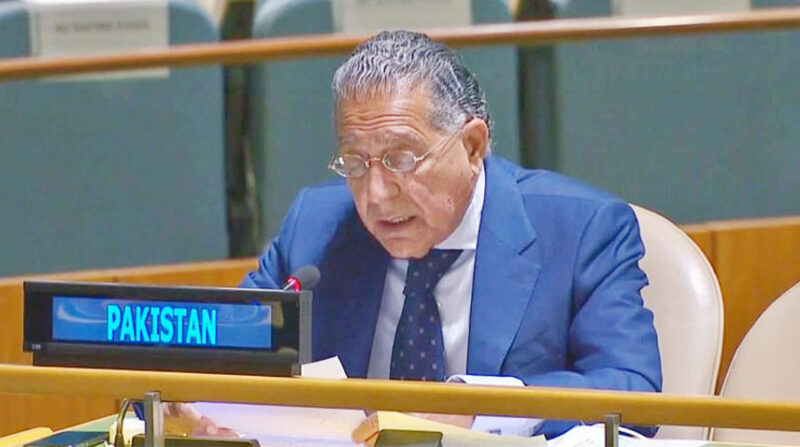NEW YORK: Pakistan has called for democratic reforms in the United Nations Security Council (UNSC), rejecting proposals for permanent seats that create elite privileges.
Highlighting the need for equitable regional representation, Ambassador Munir Akram advocated expanding non-permanent seats as the fairest solution. He emphasized that reform must uphold the principle of equality among UN member states.
Welcoming the expansion of convergences in the IGN process, Ambassador Munir Akram, Pakistan’s Permanent Representative to the UN, reiterated the Uniting for Consensus (UfC) group’s position of increasing the membership of the Security Council up to 26/27 in the non-permanent category, dubbing this as the best possible way forward for the reform.
Pakistan is a leading member of UfC along with a dozen countries.
Ambassador Akram was making a statement during the first Intergovernmental negotiation process (IGN) meeting on the categories of membership and cross-regional representation in the UN today. He rejected the claims by the aspirants of permanent membership regarding their reference to ‘new realities’ and said that there are more than four or six states, possibly 20, which are making greater contribution to peace and security than the four aspirants of UN permanent membership.
The Pakistan UN Ambassador termed the UfC’s proposal to add only non-permanent members, elected periodically by the General Assembly, as democratic and consistent with the Charter’s prescription that the Security Council “acts on behalf” of the entire membership of the General Assembly.
He said that the elected-10 non-permanent members of have taken the lead in fulfilling the responsibilities of the Security Council, warning that addition of six new members to UN Security Council would undermine equitable regional representation for the 182 member countries.
“Indeed, new individual permanent members would expand the “game of thrones” in the Security Council and intensify the prospects of its paralysis and dysfunction,” he stated.
While acknowledging historic injustice against Africa as well as other regional groupings such as the OIC, Arab Group, Asia and Latin America, Ambassador Munir Akram reminded that UfC’s proposal regarding “regional representation” can contribute to redressing such historic injustices against the under-represented regions.
He said that “under our proposal, regions could determine the modalities for nominating their representatives and their fair rotation, adhering to the principle of regional ownership.”
He also said that UfC’s framework could also ensure the adequate representation of the cross-regional groups, adding that the countries of these groupings have special interest and perspective on peace and security.
Ambassador Munir Akram has emphasized the critical progress achieved in the Intergovernmental Negotiations (IGN) process for United Nations Security Council reform. Highlighting ten key principles, he underscored the widespread agreement on expanding non-permanent seats, while consensus on adding permanent members remains elusive. He advocated for equitable representation, particularly for historically underrepresented regions such as Africa, Asia-Pacific, and Latin America. Stressing a regional approach, he proposed a “consolidated model” to address divergences across size, categories, veto power, regional representation, and working methods.
Akram reaffirmed the IGN as the ideal mechanism for consensus-building, cautioning against unilateral actions that could fracture UN membership. He noted that while timely reform is essential, no arbitrary deadline has been imposed, and decisions must reflect the broadest agreement among Member States.


Comments are closed.